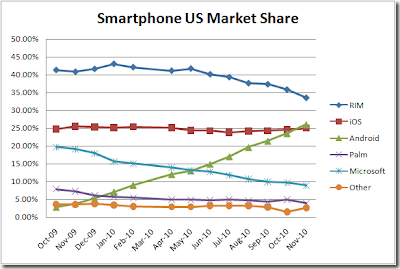The latest statistics from ComScore shows that Android has now overtaken RIM and become #1 in the US, in total number of smartphone subscribers.
Source: comScore
go2 Smedis
Random programming tips and ideas
Monday, March 7, 2011
Sunday, February 6, 2011
Android sells more smartphones than all others combined
In the US, more Android smartphones are sold than all others combined.
These numbers include the Microsoft WP7 launch, which went very poorly. Twice as many people bought the old Windows Mobile (four percent) compared to new WP7 phones (two percent), adding up to a total sale share of 6% for Microsoft.
Source: NPD
These numbers include the Microsoft WP7 launch, which went very poorly. Twice as many people bought the old Windows Mobile (four percent) compared to new WP7 phones (two percent), adding up to a total sale share of 6% for Microsoft.
Source: NPD
Android sells most smartphones in the world
In 2010 Q4, Android overtook Nokia and became the best seller in the world.
Note that this is in unit sales and is only an indication of where the market shares are heading in the future. There are so many people who already have a smartphone and just a few people (relatively speaking) buy new phones each month, so the market shares in absolute terms are changing at a slower pace.
Source: Canalys
Note that this is in unit sales and is only an indication of where the market shares are heading in the future. There are so many people who already have a smartphone and just a few people (relatively speaking) buy new phones each month, so the market shares in absolute terms are changing at a slower pace.
Source: Canalys
Android overtakes iPhone
In November 2010, Android overtook iPhone in the US market, in total number of smartphone subscribers.
Source: ComScore.com
Source: ComScore.com
Wednesday, September 22, 2010
Monday, September 13, 2010
NTouch released on Android Market
My first app was just released on the Android Market. It's a very simple app that visualizes multi-touch capabilities (or incapabilities!) of any device that runs Android 1.5 or higher: http://www.appbrain.com/app/com.smedis.ntouch
Even in this little app, I learned quite a lot. I learned how to support multiple OS versions in a single APK (set target SDK high, set minSdkVersion low and encapsulate all version-specific code). Unfortunately there aren't any compiler help to spot incompabilities in the version-specific code. The code that was written for the old OS version don't trigger any compile errors/warnings if it tries to use a newer API. If it fails, it will fail at run-time. And there isn't any c-preprocessor to make it easy to compile differently. :/
Perhaps it's possible to make various test environments with Ant, separating code for Android 1.5 and make sure they compile fine in a pure Android 1.5 environment. Then another separation for code that's for Android 2.1 and test that path separately. Would be very neat. Need some ant XML magic here perhaps...
NTouch is pretty interesting when you turn on event logging... You'll see the original Droid do some weird things, especially when the second pointer hits. It'll incorrectly report the same position for both touches at that time, and subsequent MOVE events may switch the touch id. (It's possible that this is fixed in Droid's Froyo update...)
The precision and robustness also depends on whether you hold the device in your hand or not. When the device is lying on a table and isn't "grounded", your touches can generate weird results...
With event logging turned on, you can also see what happens when the orientation changes. The app is actually shut down and restarted by the OS. However, all current touches are lost in the transition. If you keep a finger on the screen during an orientation change you'll stop receiving any more touch events. You'll have to release the finger and put it back on the screen to start generating touch events again. Seems like an OS issue.
Even in this little app, I learned quite a lot. I learned how to support multiple OS versions in a single APK (set target SDK high, set minSdkVersion low and encapsulate all version-specific code). Unfortunately there aren't any compiler help to spot incompabilities in the version-specific code. The code that was written for the old OS version don't trigger any compile errors/warnings if it tries to use a newer API. If it fails, it will fail at run-time. And there isn't any c-preprocessor to make it easy to compile differently. :/
Perhaps it's possible to make various test environments with Ant, separating code for Android 1.5 and make sure they compile fine in a pure Android 1.5 environment. Then another separation for code that's for Android 2.1 and test that path separately. Would be very neat. Need some ant XML magic here perhaps...
NTouch is pretty interesting when you turn on event logging... You'll see the original Droid do some weird things, especially when the second pointer hits. It'll incorrectly report the same position for both touches at that time, and subsequent MOVE events may switch the touch id. (It's possible that this is fixed in Droid's Froyo update...)
The precision and robustness also depends on whether you hold the device in your hand or not. When the device is lying on a table and isn't "grounded", your touches can generate weird results...
With event logging turned on, you can also see what happens when the orientation changes. The app is actually shut down and restarted by the OS. However, all current touches are lost in the transition. If you keep a finger on the screen during an orientation change you'll stop receiving any more touch events. You'll have to release the finger and put it back on the screen to start generating touch events again. Seems like an OS issue.
Friday, September 10, 2010
Subscribe to:
Posts (Atom)





